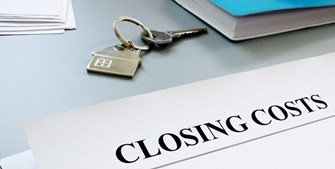When closing on a home, buyers want to save as much as they can, and sellers want to profit as much as possible, but the deal cannot close until each pays their share of closing costs. The same is true for homeowners refinancing their existing mortgage loan.
Closing costs typically add between 2-5% of the loan amount for borrowers (buyers and homeowners who are refinancing) and 6-10% of a home’s sale price for sellers, so it’s imperative that all parties understand how much to bring to the closing table well in advance. This article will address frequently asked questions about closing costs.
What costs are due at closing?
Closing costs include all the fees and expenses you incur when buying or refinancing a home, in addition to the down payment. Your particular closing costs depend on several factors, but generally fall into three categories: lender’s fees, third-party fees and prepaid items. Below is an overview of common closing costs.
Lender’s Fees
These illustrative costs are what lenders tend to charge to process, underwrite and close a mortgage loan.
|
|
Third-Party Fees
These illustrative costs are for common products and services required by your lender.
|
|
Prepaid Items
Most prepaid costs go into an escrow account that pays homeownership costs on the buyer’s behalf.
|
|
What factors can affect closing costs?
- Location. Closing requirements and fees vary by state and county (and sometimes city).
- Purchase price of the home. Some closing costs are based on a percentage of the home’s sale price. The higher the price, the more you can expect to pay in property taxes and title insurance. On a similar note, the larger the property, the more you are likely to pay in survey fees (for land) and home warranty fees (for homes over 5,000 square feet).
- Your down payment. If your down payment is less than 20% of the home’s value, many lenders require you to pay a private mortgage insurance (PMI) premium at closing.
- Your mortgage lender. Lenders offer different rates, fees and options that determine what you will pay at closing, so it pays to shop around and compare costs.
- Your credit score. Aside from meeting loan eligibility criteria, the higher your credit score, the more power you may have to negotiate with your lender.
- Type of home loan. Some loans require borrowers to pay certain costs upfront. For example, the VA requires its borrowers to pay a VA funding fee.
Who pays for what?
It depends on where you live and what is negotiated in the purchase agreement. Buyers are typically responsible for the bulk of closing costs, and the buyer and seller are each responsible for paying the commission/compensation for their respective real estate agents. Buyers can ask sellers to cover some of their closing costs, including the real estate agent's commission/compensation but the seller either may not oblige or may counter.
How can I estimate my closing costs?
- Anyone considering buying, selling or refinancing can plug their details and a sales price into an online net sheet and instantly get an idea of what to expect in closing costs.
- Sellers typically receive a net sheet from their real estate professional that provides estimates of what is due to or owed by the seller at closing.
- Buyers get a Loan Estimate (LE) from their lender after applying for a mortgage loan. This document outlines terms of the loan and itemizes the buyer’s estimated closing costs.
When will I know my actual closing costs?
Lenders are required to provide all parties to the transaction with a copy of the Closing Disclosure (CD) at least three business days before their scheduled closing. This document provides exact closing costs.
Borrowers are advised to compare the CD to the Loan Estimate, and sellers compare it to their netsheet. Some closing costs can change, but under the federal TILA-RESPA Integrated Disclosure (TRID) Rule, lender fees, appraisal fees and transfer taxes should remain the same.
Can I lower my closing costs?
It’s possible but must be done early in the homebuying or refinancing process. Many closing costs are set in stone, but some are optional or negotiable.
Which closing costs are fixed?
Prepaid items are fixed. Who pays for them may be negotiated, but not the amount.
Which closing costs are optional?
Some third-party fees may be waived. For example, buyers willing to purchase a property “as is” may waive a home inspection. Home appraisals may also be waived under certain circumstances. Home warranty and owner’s title insurance are optional. However, waiving them at closing may leave homeowners vulnerable to costly expenses down the road, so the decision to forgo them should not be made lightly.
Which closing costs are negotiable?
Lender’s fees, especially origination costs, may be negotiable. Some lenders allow their borrowers to purchase lender credits, so they can roll some or all of their closing costs into their loan in exchange for a higher interest rate. Although this means paying more over time, it requires less cash to close. Each buyer has to decide which strategy makes sense for their situation.
Who do I call with questions about my closing costs?
The list of closing costs can be long and hard to interpret. Don’t be afraid to call your lender to clarify any terms or costs you don’t understand. You may also wish to consult with an attorney. Do not sign closing documents until you are clear about your financial obligations.
Whether you’re buying, selling or refinancing, it’s important to understand and anticipate how much you could owe at closing, so you can budget accordingly. When you’re ready to take the next step, Old Republic Title is here to guide you through the closing process, close your transaction and protect your investment with title insurance. For more information, contact an Old Republic Title representative today.




